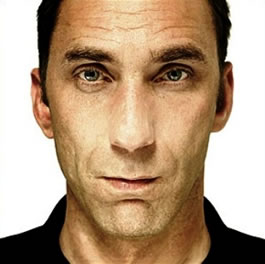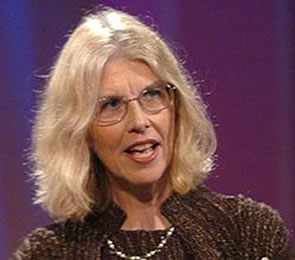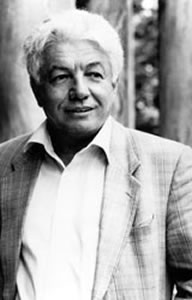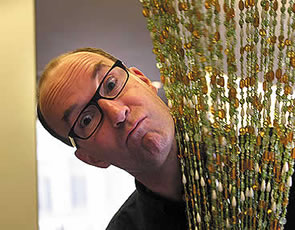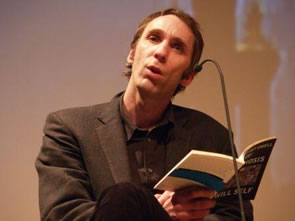De Engels-Amerikaanse dichter en schrijver T. S. Eliot werd op 26 september 1888 geboren in St.Louis, Missouri. Zie ook mijn blog van 26 september 2006.
Morning At The Window
They are rattling breakfast plates in basement kitchens,
And along the trampled edges of the street
I am aware of the damp souls of housemaids
Sprouting despondently at area gates.
The brown waves of fog toss up to me
Twisted faces from the bottom of the street,
And tear from a passer-by with muddy skirts
An aimless smile that hovers in the air
And vanishes along the level of the roofs.
EAST COKER
(No. 2 of ‘Four Quartets’)
I
In my beginning is my end. In succession
Houses rise and fall, crumble, are extended,
Are removed, destroyed, restored, or in their place
Is an open field, or a factory, or a by-pass.
Old stone to new building, old timber to new fires,
Old fires to ashes, and ashes to the earth
Which is already flesh, fur and faeces,
Bone of man and beast, cornstalk and leaf.
Houses live and die: there is a time for building
And a time for living and for generation
And a time for the wind to break the loosened pane
And to shake the wainscot where the field-mouse trots
And to shake the tattered arras woven with a silent motto.
In my beginning is my end. Now the light falls
Across the open field, leaving the deep
lane
Shuttered with branches, dark in the afternoon,
Where you lean against a bank while a van passes,
And the deep lane insists on the direction
Into the village, in the electric heat
Hypnotised. In a warm haze the sultry light
Is absorbed, not refracted, by grey stone.
The dahlias sleep in the empty silence.
Wait for the early owl.
In that open field
If you do not come too close, if you do not come too close,
On a summer midnight, you can hear the music
Of the weak pipe and the little drum
And see them dancing around the bonfire
The association of man and woman
In daunsinge, signifying matrimonie—
A dignified and commodiois sacrament.
Two and two, necessarye coniunction,
Holding eche other by the hand or the arm
Whiche betokeneth concorde. Round and round the fire
Leaping through the flames, or joined in circles,
Rustically solemn or in rustic laughter
Lifting heavy feet in clumsy shoes,
Earth feet, loam feet, lifted in country mirth
Mirth of those long since under earth
Nourishing the corn. Keeping time,
Keeping the rhythm in their dancing
As in their living in the living seasons
The time of the seasons and the constellations
The time of milking and the time of harvest
The time of the coupling of man and woman
And that of beasts. Feet rising and falling.
Eating and drinking. Dung and death.
Dawn points, and another day
Prepares for heat and silence. Out at sea the dawn wind
Wrinkles and slides. I am here
Or there, or elsewhere. In my beginning.

T. S. Eliot (26 september 1888 – 4 januari 1965)
Geschilderd door Wyndam Lewis
De Nederlandse Dichter en schrijver Bart Chabot werd geboren in Den Haag op 26 september 1954. Zie ook mijn blog van 26 september 2006.
The early seventies
’s Ochtendsvroeg
deed ik al hasj
in m’n yogurt
Had je een drukke dag
als je een brief
moest posten
Opgestaan, plaats vergaan
op een nacht stond ik op uit de doden
ik was de enige kandidaat naar het scheen
de anderen gaven niet thuis
die bleven liever liggen
voor alle zekerheid, je-kan-niet-weten
keek ik nog eens indringend om me heen
maar nee
ook in tweede instantie maakte niemand
aanstalten mijn voorbeeld te volgen
zelf iemand wekken deed ik niet
eerlijk gezegd vond ik het wel zo prettig
in mijn eentje te blijven
ik had het rijk alleen
ik besloot tot een ommetje
een kleine wandeling door de straten
om oud eik en duinen, een besluit dat de aarde
niet merkbaar uit haar evenwicht bracht
dit kwam goed uit, wereldschokkende-
dingen-doen behoorde al geruime tijd
niet meer tot mijn ambities
maar eenmaal door de
straten gaand
kreeg ik honger naar meer
stadsleven
zo gezegd, zo gedaan
(wie of wat zou me
tegen moeten houden?)
en zonder haast trok ik het centrum in
men was nog lang niet van me af

Bart Chabot (Den Haag, 26 september 1954)
De Nederlandse schrijver Thomas van Aalten werd geboren in Huissen bij Arnhem op 26 september 1978.
Uit: Sluit deuren en ramen
“Een laf applaus volgde. Het zaallicht dimde. Gekraak
in de boxen. Dan verscheen in zeeblauwe letters op een witte achtergrond de tekst ‘Substaat Redux. Omdat geborgenheid uw recht is’.
Als soundtrack was gekozen voor een jazzdeuntje uit een goedkoop keyboard. Beelden van lachende gezinnen die badmintonden op een knalgroen grasveld. Een door de computer geanimeerde vlucht in de hemel boven een hagelwit plein met een groot winkelcentrum, een bioscoop, een zwembad, een bos. Dan weer die tekst. Substaat Redux. Omdat geborgenheid uw recht is. Een zalvende voice-over van een bekende acteur. ‘Welkom in Substaat Redux. Een luxueuze woongelegenheid met vele mogelijkheden voor het gezin. Ongetwijfeld zult u verlangen naar het onbekommerde gevoel dat u nog kende van enkele jaren geleden, nog voordat dit land werd opgeschrikt door ernstige gevoelens van angst en onrust.’
Archiefbeelden van groepen jongeren met bivakmutsen en stokken in gevecht met de Mobiele Eenheid. Brandende hopen vuil in de straten. Huilende moeders.
Terug naar de geanimeerde beelden. Een gezin wandelde langs de schappen van een supermarkt. Een jongetje legde een teddybeer in het boodschappenwagentje, de vader lachte hem toe en aaide het jongetje over de bol.
‘We willen u weer terugzetten op de plek die u verdient. Op de plek waar u veilig kunt rondlopen met uw kind of huisdier, zonder angsten. Ontspanning en rust zijn twee belangrijke punten, maar ook zijn er vele arbeidsvoorzieningen. Daarbij wordt u voortdurend beschermd door een professionele eenheid die uw veiligheid waarborgt.’
Een shot van een lachende beveiligingsbeambte die een balletje trapte met een paar gekleurde kinderen. Een andere beambte wees de weg aan een man in een rolstoel met een hond op zijn schoot.
‘Tevens zorgen speciale veiligheidsschilden die in de funderingen van de woningen zijn aangebracht, voor een optimale beveiliging tegen allerlei vormen van terreur.’
Computeranimatie: dwarsdoorsnede van een huis.”

Thomas van Aalten (Huissen, 26 september 1978)
De Engelse schrijver, criticus en columnist William Self werd geboren in Londen op 26 september 1961.
Uit: The Principle
„When I reach the intersection with Interstate 15, just south of the Toquerville turning, I always have the same choice: I can turn northeast, to Cedar City, and a quiet evening in the library working on my memoirs; or I can turn southwest, and burn rubber the seventy-odd miles to Las Vegas. Every few months I take the road less traveled. Across the Utah border, cutting off the corner of Arizona, the freeway runs down into the wide gulch of the Virgin River, then it mounts up on to the plateau of the Mohave Desert, a silvery wake rising and falling across the waves of scrub, until the lights of that modern Babylon begin to sparkle in the crystalline nighttime air.
They always put me in mind of an ocean oil rig — the Vegas lights — not that I’ve ever seen one; yet the desert itself is my sea, the hood of my ancient Ford pickup a prow, and even from ten miles off, if I wind down the window, I can hear through the rush of hot air, the steady, rhythmic pulse of the city’s casinos, burlesques and whorehouses, as they pump thick, black, glutinous sin out of the souls of men and women.
Don’t get me wrong, I don’t go down to Vegas out of any desire to test myself. I’m not in the business of flirting with the Devil. I know what I am, and who I am: a man of conviction, a man with responsibilities, a man who has made the Principle the very rock on which he has built his life. But for all that, we all need a little recreation once in a while, a little time out, wouldn’t you agree?
I always park up in the same trash-strewn alley, behind the same fly-blown Mexican diner. I always have the same super-sized cheesy burrito and 7-Up. Then I walk the half-mile or so along the Strip to Gary’s Place. Now that I’m in my late sixties, younger people often ask me about the changes I’ve seen in my lifetime. I always tell them the same thing: “Every era I’ve lived through has been now.” And I mean it. Living out of the way like we folk do, means we don’t pay much attention to the styling of automobiles, or the size of computers.
About the only time I see gentiles at all is when I go to Vegas. And so what if they wear their hair this way or that, and talk about this or that shiny, new thing? It don’t mean too much to me. The generality of life, I’ve always felt, takes place in between such modern gewgaws. It’s the mortar, not the bricks that count.“

William Self (Londen, 26 september 1961)
Zie voor alle bovenstaande schrijvers ook mijn blog van 26 september 2007 en ook mijn blog van 26 september 2008.
Zie voor nog meer schrijvers van de 26e september ook mijn vorige blog van vandaag.



